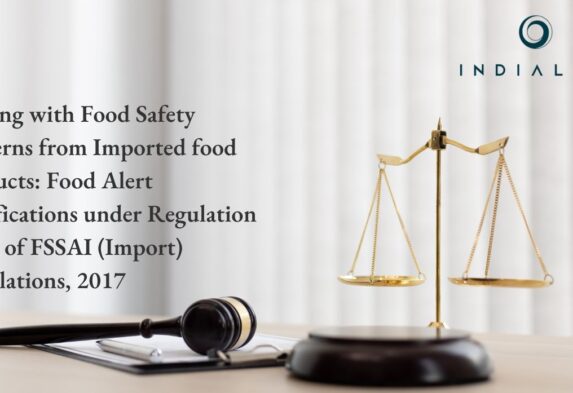Dealing with Food Safety concerns from Imported food products: Food Alert Notifications under Regulation 11(7) of FSSAI (Import) Regulations, 2017


India has taken a firm stance on food safety, rejecting consignments of apples, nuts, alcoholic beverages, and sushi from Sri Lanka, Bangladesh, Japan, China, and Turkey this year for failing to meet its stringent food safety standards.
The Food Safety and Standards Authority of India (FSSAI), the country’s apex food regulator, has unveiled a pivotal tool to enhance transparency and public safety—the Food Import Rejection Alert (FIRA) portal. This innovative platform facilitates the rapid exchange of information on rejected food consignments among global authorities, empowering stakeholders to take swift preventive actions. By enabling enhanced traceability and risk control, FIRA marks a significant step forward in safeguarding consumer health and reinforcing India’s commitment to stringent food safety norms.
In a world where global trade has seamlessly interconnected food supply chains, ensuring food safety remains a paramount concern. The Food Safety and Standards Authority of India (FSSAI), established under the Food Safety and Standards Act, 2006, has taken progressive measures to safeguard public health. One of the key instruments in its arsenal is Regulation 11(7) of the Food Safety and Standards (Import) Regulation, 2017, empowering the Authority to issue Food Alert Notifications.
Understanding Regulation 11(7): A Framework for Rapid Response
Regulation 11(7) equips the FSSAI to proactively address potential food safety threats arising from imported food products. Under this provision, the Food Authority can issue food alert notifications when risks to human health are identified, ensuring swift communication with stakeholders. These alerts serve as a crucial mechanism to:
- Prevent Public Health Hazards: Alerts inform consumers, importers, and authorities about unsafe or non-compliant food products, minimizing exposure to health risks.
- Ensure Compliance: Importers and stakeholders are prompted to take corrective actions, including recalls or withdrawals of affected products.
- Strengthen Food Safety Enforcement: By identifying and addressing hazards, the FSSAI reinforces the regulatory framework to prevent future occurrences.
What Triggers a Food Alert Notification?
Food alert notifications are issued in response to evidence-based risks, which may include:
- Detection of hazardous substances such as toxins, pathogens, or contaminants in imported food products.
- Violations of prescribed standards under the Food Safety and Standards Act, 2006.
- Reports from international food safety agencies about potential risks associated with products in the global supply chain.
- Consumer complaints or scientific research highlighting public health concerns.
The Process of Issuing Food Alerts
The issuance of a food alert involves a robust, multi-step process:
- Risk Assessment: FSSAI conducts scientific evaluations based on data from import inspections, laboratories, or global food safety networks.
- Stakeholder Communication: Importers, state food authorities, and enforcement bodies are informed about the identified risk.
- Public Notification: Alerts are disseminated through the FSSAI website, media channels, and official networks, ensuring timely access to critical information.
- Corrective Action Monitoring: The FSSAI oversees the implementation of recall or destruction protocols, ensuring that non-compliant products are effectively removed from the market.
Recent Food Alert Initiatives
Over the years, food alert notifications have played a pivotal role in safeguarding Indian consumers from potentially harmful products. For instance:
- Alerts on imported food items containing allergens not declared on labels.
- Notifications regarding food contaminated with microbial pathogens such as Salmonella or E. coli.
- Warnings about the presence of unauthorized additives or excessive pesticide residues.
These alerts not only protect consumers but also reinforce the importance of compliance among importers and other stakeholders.
How Stakeholders Can Contribute
While FSSAI spearheads food safety initiatives, collective responsibility is key to success:
- Consumers: Stay informed through the FSSAI website and report concerns regarding imported food products.
- Importers: Adhere to regulatory standards and proactively conduct quality checks.
- State Authorities: Collaborate with the FSSAI to enforce compliance and address violations.
Conclusion
The authority to issue food alert notifications under Regulation 11(7) underscores FSSAI’s commitment to ensuring the safety and well-being of Indian consumers. In a dynamic and interconnected food landscape, such proactive measures are vital for addressing emerging risks, fostering transparency, and building trust in the food system.
Stay vigilant and informed by regularly visiting FSSAI’s Food Import Regulation Advisory (FIRA) section for updates on food alerts and related advisories. Together, we can uphold the highest standards of food safety for all.
For further details write to contact@indialaw.in




